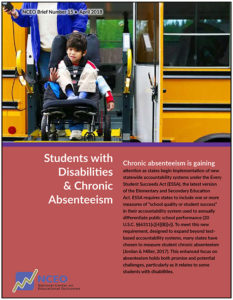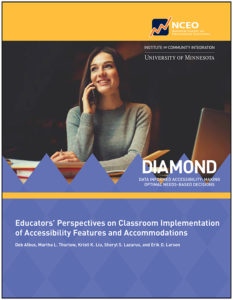Welcome
Summer greetings from NCEO! In this issue, we highlight several upcoming events, plus a couple of new reports available from NCEO. First, the upcoming pre-conference session to the National Conference on Student Assessment (NCSA) in June in San Diego. The pre-conference session will focus on the use of speech-to-text. Following that is a listing of the sessions in which NCEO staff are participating during the NCSA conference, as well as at the International Test Commission Conference in Montreal at the beginning of July. PowerPoints from many of these sessions will be posted on NCEO websites following these conferences. Also highlighted in this issue are two new reports. One Brief (Students with Disabilities and Chronic Absenteeism), along with accompanying supplemental materials, focuses on chronic absenteeism, an accountability indicator being used by a majority of states for the Every Student Succeeds Act Title I accountability system. Also, a new report from the DIAMOND Project is summarized. This report, Educators’ Perspectives on Classroom Implementation of Accessibility Features and Accommodations, shares the results of a study conducted through phone interviews in seven states.
– Martha Thurlow, NCEO Director
NCSA Pre-Conference Session: Speech to Text and Scribing – Getting a Handle on What it Means
NCEO and the ASES SCASS will be hosting a pre-session at the National Conference on Student Assessment in San Diego California titled, Speech to Text and Scribing – Getting a Handle on What it Means. This session will be held on June 26 from 3:30–6:30 p.m. This NCSA pre-session will bring together states, assessment vendors, and other educational stakeholders to address the need to develop clarity on the implementation of the speech-to-text and scribe accessibility features and accommodations.
NCEO Presentations at 2018 National Conference on Student Assessment
![]() The 2018 National Conference on Student Assessment (NCSA) is the premiere forum for assessment practitioners to discuss what is happening in the real world of educational assessment—what is new, what is going on at the state and federal level, what works, and what does not. This year, the NCSA meeting will be held in San Diego, California on June 27-29, and NCEO staff members will participate in several sessions.
The 2018 National Conference on Student Assessment (NCSA) is the premiere forum for assessment practitioners to discuss what is happening in the real world of educational assessment—what is new, what is going on at the state and federal level, what works, and what does not. This year, the NCSA meeting will be held in San Diego, California on June 27-29, and NCEO staff members will participate in several sessions.
NCEO Staff Represented at the International Test Commission Conference
 NCEO is presenting at the International Test Commission (ITC)’s 11th conference in Montreal, Canada, July 2-5, 2018. ITC is committed to promoting effective testing and assessment policies, and to proper development, evaluation, and uses of educational and psychological instruments.
NCEO is presenting at the International Test Commission (ITC)’s 11th conference in Montreal, Canada, July 2-5, 2018. ITC is committed to promoting effective testing and assessment policies, and to proper development, evaluation, and uses of educational and psychological instruments.
Students with Disabilities and Chronic Absenteeism
 NCEO recently published a Brief on Students with Disabilities and Chronic Absenteeism. The 2015 reauthorization of the Elementary and Secondary Education Act (ESEA), as the Every Student Succeeds Act (ESSA), requires states to include one of more school quality or student success measures in their accountability system. Many states have selected chronic absenteeism as their school quality measure. This Brief contains information about chronic absenteeism and possible implications for students with disabilities.
NCEO recently published a Brief on Students with Disabilities and Chronic Absenteeism. The 2015 reauthorization of the Elementary and Secondary Education Act (ESEA), as the Every Student Succeeds Act (ESSA), requires states to include one of more school quality or student success measures in their accountability system. Many states have selected chronic absenteeism as their school quality measure. This Brief contains information about chronic absenteeism and possible implications for students with disabilities.
New DIAMOND Report on Educators’ Perspectives on Classroom Implementation of Accessibility Features and Accommodations
 The DIAMOND project has released a report titled Educators’ Perspectives on Classroom Implementation of Accessibility Features and Accommodations. The report describes a series of telephone interviews conducted with educators in seven of DIAMOND’s nine project states. The interview data highlight educators’ understanding and implementation of accessibility features and accommodations on state assessments and in instruction.
The DIAMOND project has released a report titled Educators’ Perspectives on Classroom Implementation of Accessibility Features and Accommodations. The report describes a series of telephone interviews conducted with educators in seven of DIAMOND’s nine project states. The interview data highlight educators’ understanding and implementation of accessibility features and accommodations on state assessments and in instruction.
NCEO’s National Assessment Center is supported through a Cooperative Agreement (#H326G160001) with the Research to Practice Division, Office of Special Education Programs, U.S. Department of Education. The Center is affiliated with the Institute on Community Integration at the College of Education and Human Development, University of Minnesota. The contents of this report were developed under the Cooperative Agreement from the U.S. Department of Education, but do not necessarily represent the policy or opinions of the U.S. Department of Education or Office within it. Readers should not assume endorsement by the federal government.
